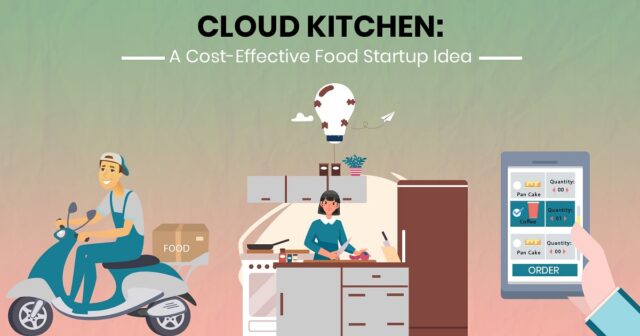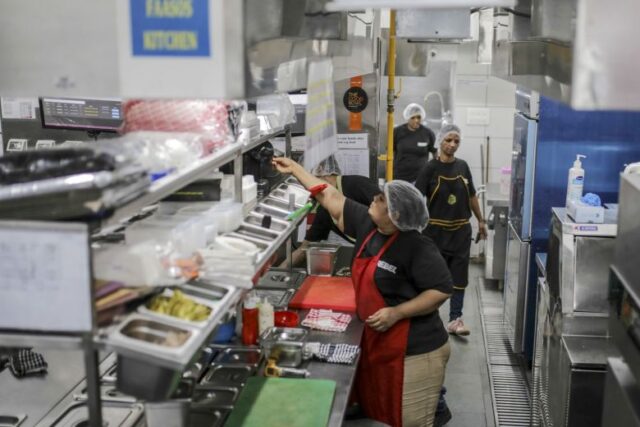The coronavirus crisis has urged people to adopt new ways of living. With the ongoing unlock phase in the country, industries are taking up novel and innovative ways to fight against the virus while ensuring livelihood and health concerns.
This pandemic has given rise to many new concepts that might still boom even in the post-COVID world.
One such concept that has been gaining much popularity in the country is of a cloud kitchen. Cloud kitchens are a new introduction to the food industry and are acting as a boon to the food business during the COVID-19 crisis.
Although the concept was first implemented a long time back, it has amassed massive popularity in recent times. In fact, you might already be using the services of a cloud kitchen but aren’t aware of it. So, let’s find out if your food is coming from a cloud kitchen.
What Is A Cloud Kitchen?
A cloud kitchen is also known as ‘virtual kitchen’ or a ‘dark kitchen’. It refers to an exclusively only-delivery restaurant and has come out as a monumental shift in the food industry.
Such kitchens do not have a dine-in facility and are only equipped with a counter-like takeaway system. People can order online and then eat the food in the comfort of their homes.
Cloud kitchens also involve the concept of food delivery and encourage small food outlets. Under the could kitchen service, a small food outlet or a chain of food brands can prepare the food as per order and deliver it to the consumers’ houses.
There are a lot of restaurants and food brands that are adopting this new concept to keep up with the large orders instead of a dine-in facility.
Cloud kitchens are great, especially in these COVID times. Popular food delivery apps like SWIGGY, Zomato, etc are getting converted to cloud kitchens instead of dine-in restaurants.
Not only it ensures safety but also avoids crowding and human contact which makes this concept a win-win in such unprecedented situations. So it’s true that the majority of food orders and outside eating during the pandemic is executed via cloud kitchens only.
What makes it popular?
Apart from the added edge of safety and social distancing, cloud kitchens are also very cost-effective.
Setting up a restaurant with proper dine-in facilities requires a heavy investment. The cost of real estate, parking lots, prime location charges, infrastructure, and decor, what not!
Moreover, the charges for hiring decent waiters and hospitality staff along with over the top branded cutleries should also be considered. But with cloud kitchens, it all gets cut down to minimal cost yet yields higher sales growth due to ease of work and flexibility.
Read Also: How The Concept Of Social Bubble Is Helping Fight Coronavirus?
With less space and less labor required, cloud kitchens can also make a brand name of their food outlet by focussing on food quality and packaging.
The amount spent in setting up one decent restaurant can be used to open 10 cloud kitchens at various locations which can help in making a brand name of a small food outlet.
An example of such a strategy is the newly famous food chain called Faasos. It is also a cloud kitchen turned food brand that runs more than 160 kitchens successfully in different regions.
Future Prospectives
The future of cloud kitchens in India looks bright. According to RedSeer Management Consulting, cloud kitchens are likely to become a 2 billion dollar industry in India by 2024. Such speculations were made after gathering insights from various market pioneers.
Joydeep Bhattacharya, head of Bain India’s Consumer Products and Retail practices says, “An obligation to reduce non-essential outdoor activities and an increased supply of cloud kitchens in both existing brands and new entrants will accelerate the pre-COVID trend of ordering in and takeaways, and become a permanent shift post-crisis.”
Research by CAGR says that cloud kitchens are likely to rise by 17.25% by the end of 2030. Considering the decreasing rate of footfall in restaurants, cloud kitchens seem to be a promising alternative to the food industry.
Millennials and Gen Z are technologically driven people who like easy and quick services without much effort. With cloud kitchens betting on saving serving time and home comfort services, it seems like the new age will be more willing to adapt to such a concept even after the pandemic ends.
Image Credits: Google Images
Sources: Livemint, Bloomberg, Times Of India
Find the Blogger: @ZehraYameena
Other Recommendations:
Falsely Claimed Anti-COVID Devices In The Market You Should Not Fall For!






































